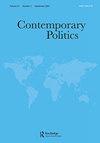Populist sovereigntism and international cooperation: the case of Brazil and Hungary
IF 2
3区 社会学
Q1 POLITICAL SCIENCE
引用次数: 0
Abstract
Sovereignty becomes an essential concept when populist participation in international politics is examined. The research questions of this article are as follows: Which topics do right-wing populist leaders (Jair Bolsonaro and Viktor Orbán) connect to state sovereignty in International Organisations (IOs)? How do they act in IOs to defend the sovereignty of their countries if they perceive it – or their domestic power base – to be threatened? The article examines the behaviour of Brazil and Hungary in the United Nations, the European Union (Hungary) and the Organisation of American States (Brazil). The results illustrate that instead of quitting IOs, the populist leaders examined prefer to find like-minded allies among member states, while they also use harsh rhetoric and/or abstention/the power of veto in an attempt to reshape the direction of IOs when they see their countries’ sovereignty and/or their domestic power as threatened.民粹主义主权主义与国际合作:巴西和匈牙利的例子
当考察民粹主义参与国际政治时,主权成为一个必不可少的概念。本文的研究问题如下:右翼民粹主义领导人(Jair Bolsonaro和Viktor Orbán)将哪些话题与国际组织(IOs)中的国家主权联系起来?如果他们认为自己国家的主权或国内权力基础受到威胁,他们会如何采取行动来捍卫自己国家的主权?这篇文章考察了巴西和匈牙利在联合国、欧盟(匈牙利)和美洲国家组织(巴西)中的行为。结果表明,民粹主义领导人并没有退出国际组织,而是更愿意在成员国中找到志同道合的盟友,同时,当他们看到自己国家的主权和/或国内权力受到威胁时,他们也会使用严厉的言辞和/或弃权/否决权,试图重塑国际组织的方向。
本文章由计算机程序翻译,如有差异,请以英文原文为准。
求助全文
约1分钟内获得全文
求助全文

 求助内容:
求助内容: 应助结果提醒方式:
应助结果提醒方式:


